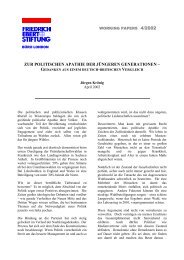Where Now for European Social Democracy? - Policy Network
Where Now for European Social Democracy? - Policy Network
Where Now for European Social Democracy? - Policy Network
Create successful ePaper yourself
Turn your PDF publications into a flip-book with our unique Google optimized e-Paper software.
Growth Policies <strong>for</strong> Europe:Is there a Common <strong>Social</strong>Democratic Agenda?JEAN PISANI-FERRYAssessmentThe growth per<strong>for</strong>mance of the EU is disappointing. The long termstatistics are telling: income per capita in the EU has <strong>for</strong> three decadesbeen stagnating at 70 per cent of the US level and since 1980, theshare of the EU in world GDP has declined by 4.5 percentage pointsfrom 23.9 per cent to 19.4 per cent in 2003, against a mere 0.5 percent drop <strong>for</strong> the US. Recent developments are also worrying, as labourproductivity growth has accelerated markedly in the US since 1995,increasing by one per cent per year between 1995 and 2002 comparedto 1990-1995; while it has decelerated in the EU, falling by one percent each year. While the slowdown in <strong>European</strong> labour productivitygrowth partially results from employment policies that have succeededin bringing low-skill, low-productivity persons back into employment,this cannot account <strong>for</strong> the whole story. There is also something wrongin the working of the engine.Finally, it is hard to be satisfied with the record of the euro areaduring the recent slowdown. Growth has been one per cent per year in2001-2003, against two per cent in both the UK and the US. It can beargued that things would have been worse without the euro – or, to putit differently, that the common currency cannot be held accountable<strong>for</strong> the weaknesses and policy mistakes of its constituent memberstates. Nevertheless, the accomplishment is clearly inferior to whathad been expected by the supporters of monetary union.This underper<strong>for</strong>mance questions the sustainability of the<strong>European</strong> social model(s), as persistently slow growth makes the fiscalcost of social protection increasingly difficult to bear. It also questions49



